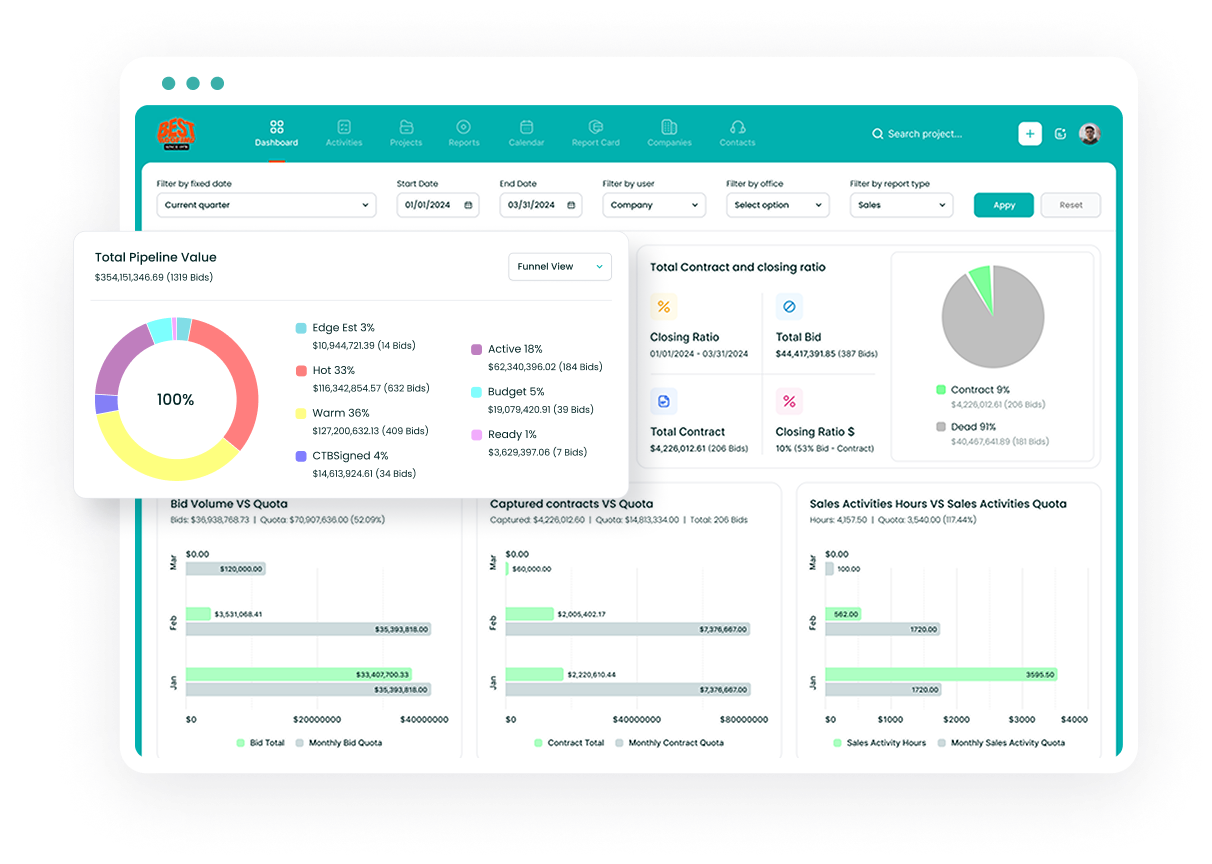HCSS vs Procore
The construction industry has witnessed a remarkable shift in how projects are managed, with digital tools becoming as essential as traditional equipment. Construction professionals now face an important choice between two leading software solutions: HCSS and Procore. These platforms have revolutionized everything from daily site operations to long-term project planning, but they each take notably different paths to achieve these goals. Understanding the distinct strengths and practical applications of each system helps construction teams select the right digital partner for their specific needs, whether managing heavy civil projects or coordinating multiple commercial builds.
Understanding Modern Construction Software Solutions
The digital transformation in construction has created a need for sophisticated management tools that can handle complex projects while maintaining efficiency. HCSS and Procore have emerged as leading solutions, each taking different approaches to address industry challenges. HCSS focuses heavily on heavy civil construction, offering specialized tools for infrastructure projects and equipment management. Meanwhile, Procore provides a broader platform that caters to various construction sectors with its comprehensive feature set.
Construction companies today require software that can seamlessly integrate multiple aspects of project management, from initial bidding to final closeout. Both platforms have evolved to meet these demands, though they differ significantly in their core strengths and implementation approaches.
Essential Features and Capabilities Analysis
Project management software must address numerous operational aspects simultaneously. HCSS excels in heavy civil construction with its HeavyBid and HeavyJob modules, providing specialized tools for complex infrastructure projects. Procore takes a more generalized approach, offering a unified platform that handles everything from bidding to project closeout.
The distinction between these platforms becomes apparent in their specialized features. HCSS's Equipment360 and FuelerPlus modules demonstrate its focus on equipment-intensive projects, while Procore's strength lies in its comprehensive document management and collaboration tools.
Mobile Functionality and Field Operations
Both platforms recognize the importance of mobile accessibility in modern construction management. Their mobile applications serve as essential tools for field teams, enabling real-time data collection and communication.
The mobile experience varies between the two platforms. HCSS provides specialized apps for different modules, allowing teams to focus on specific aspects of their work. Procore offers a more unified mobile experience, with a single app that provides access to all platform features.
User Experience and Implementation Process
The success of construction management software heavily depends on user adoption and ease of implementation. Procore has gained recognition for its intuitive interface and straightforward navigation, making it accessible to users with varying levels of technical expertise. HCSS offers powerful functionality but may require more extensive training for optimal use.
Implementation processes differ significantly between the two platforms. Procore emphasizes quick deployment with standardized onboarding procedures, while HCSS often requires more customized implementation to align with specific heavy civil construction needs.
Integration Capabilities and Ecosystem Support
Modern construction operations require seamless integration between various software tools. Both HCSS and Procore offer integration capabilities, though their approaches differ. Each platform has developed distinct integration strategies to meet the diverse needs of construction companies.
HCSS provides specialized integrations focused on heavy civil construction needs:
- Microsoft Intune integration for secure mobile device management
- Custom API development capabilities through the HCSS Developer Portal
- Export to Accounting feature compatible with any system that can import files
- Integration partnerships focused on heavy civil construction workflows
- Cross-platform synchronization between HCSS products like HeavyBid, HeavyJob, and Equipment360
Procore's extensive marketplace offers a wide range of third-party connections:
- Side Panel feature for context-aware integration experiences
- Extensive accounting software integrations including ComputerEase, Foundation, and Oracle NetSuite
- Partner-built connectors reducing manual data entry through Open API
- Real-time synchronization with project management tools like AdaptiveWork
- IoT integration capabilities for job site monitoring and conditions tracking
Cost Considerations and ROI Analysis
HCSS structures its pricing based on user roles and company size, with annual subscriptions ranging from $690 per user for subcontractors to $995 per user for general contractors. The implementation process typically includes a combination of on-site and remote training sessions at their Sugar Land, Texas campus. Their pricing model reflects their specialized focus on heavy civil construction, with separate costs for different modules like HeavyBid, HeavyJob, and Equipment360.
Procore takes a different approach with a volume-based pricing model that scales with construction value rather than user count. Their platform includes unlimited users, unlimited data storage, and 24/7 support in every contract. This pricing structure particularly benefits larger projects with multiple stakeholders, as there are no additional costs for adding team members, subcontractors, or other collaborators. Procore also provides comprehensive implementation services and free training resources, including 18 role-based certifications.
Both platforms offer predictable annual pricing with fixed renewal rates, helping companies budget more effectively for their software investments. While initial implementation costs may be substantial, both vendors provide extensive support and training resources to ensure successful adoption and maximize return on investment.
Industry-Specific Applications and Use Cases
The construction industry encompasses various specialties, each with unique requirements. HCSS has established itself as a leader in heavy civil construction, particularly among large contractors handling infrastructure projects. Procore serves a broader market, supporting general contractors, specialty contractors, and owners across different construction sectors.
These platforms demonstrate their strengths in different scenarios. HCSS shows particular value in equipment-intensive projects and complex infrastructure work. Procore excels in projects requiring extensive collaboration and document management across multiple stakeholders.
Future Development and Innovation Trends
Both platforms continue to evolve with industry needs. Recent developments show a focus on artificial intelligence, predictive analytics, and enhanced mobile capabilities. These innovations aim to provide more accurate project forecasting, improved risk management, and better decision-making tools for construction professionals.
The future of construction software points toward increased automation and integration. Both HCSS and Procore are investing in technologies that will further streamline construction processes and improve project outcomes.
Decision Framework for Platform Selection
When evaluating these platforms, construction companies should consider several key factors:
- Project type and complexity requirements
- Team size and technical expertise
- Budget constraints and ROI expectations
- Integration needs with existing systems
- Mobile functionality requirements
- Training and support preferences
The final choice between HCSS and Procore should align with your organization's specific needs, project types, and operational goals. Consider requesting detailed demonstrations and trial periods to evaluate how each platform performs in your specific context.
Data Analytics and Performance Monitoring
Construction data analytics have become increasingly vital for project success. Both HCSS and Procore offer robust reporting and analytics capabilities that transform raw project data into actionable insights. These tools enable project managers to track key performance indicators, identify trends, and make data-driven decisions.
HCSS provides specialized analytics focused on equipment utilization, crew productivity, and cost analysis. Their system particularly excels at tracking performance metrics in heavy civil construction projects, offering detailed insights into equipment efficiency and resource allocation.
Procore's analytics suite takes a broader approach, offering customizable dashboards and reports that cover all aspects of construction management. Their platform emphasizes visual data representation and real-time reporting capabilities, making it easier for stakeholders to understand project status and performance metrics.
Training Resources and Support Systems
The effectiveness of construction management software heavily depends on proper training and ongoing support. Both platforms recognize this crucial aspect and provide comprehensive training resources to ensure users can maximize their software investment.
HCSS maintains a dedicated training program that includes both online and in-person options. Their support team specializes in heavy civil construction applications, offering industry-specific guidance and troubleshooting assistance. The company also hosts regular user group meetings where clients can share experiences and best practices.
Procore's training approach centers around their Procore Certification Program and extensive online learning resources. Their support system includes 24/7 technical assistance and a robust online community where users can exchange ideas and solutions.
Security Protocols and Compliance Standards
Construction companies today face increasing challenges in protecting their sensitive project data as more operations move to digital platforms. With cybersecurity threats becoming more sophisticated, HCSS and Procore understand what's at stake for their clients. These industry leaders have stepped up to the challenge by implementing robust security measures and earning top-tier certifications that demonstrate their commitment to protecting your valuable information.
HCSS maintains distinct security features and certifications to protect client data through:
- SOC 1 and SOC 2 Type 2 compliance for financial controls and security
- Enterprise-level cloud infrastructure through partnerships with industry-leading hosting providers
- Strict organizational controls and cybersecurity policies to maintain data integrity
- Comprehensive system controls to protect customer data confidentiality
While, the Procore platform incorporates multiple layers of security measures and certifications by utilizing:
- ISO 27001:2013 certification for Information Security Management Systems
- Data encryption at rest and in transit using TLS v1.2 protocol
- 16 secure global file storage locations with 99.9% uptime guarantee
- OAuth 2.0 implementation for secure API authorization
- Compliance with CCPA, GDPR, and Australia's Privacy Act
- Multiple data centers with regular off-site backups for disaster recovery
Customization and Scalability Options
Construction companies often require software that can adapt to their specific workflows and grow with their business. HCSS offers extensive customization options for their specialized modules, allowing companies to tailor the software to their specific heavy civil construction needs. Their system can scale to handle large, complex infrastructure projects while maintaining performance.
Procore approaches customization through a flexible platform architecture that allows users to configure workflows, forms, and reports without extensive technical knowledge. Their system scales horizontally across different construction sectors, making it suitable for companies that work on diverse project types.
Both platforms provide APIs and development tools for creating custom integrations and extensions, though their approaches differ in implementation and complexity.
Maximizing Construction Software Implementation Success
Selecting and implementing construction management software requires careful consideration of organizational needs and capabilities. Understanding the distinct advantages of HCSS and Procore helps construction professionals align their technology choices with business objectives. The right software choice depends on factors such as project complexity, team size, and specific industry requirements.
Successful implementation requires commitment from all levels of the organization and a clear plan for training and adoption. Regular evaluation of software utilization and performance metrics ensures the chosen platform continues to meet evolving business needs. Companies should maintain open communication with their software provider and actively participate in user communities to stay current with new features and best practices.
The construction industry continues to evolve with technological advancements, and both HCSS and Procore demonstrate strong commitments to innovation and improvement. Construction professionals should regularly assess their software needs and capabilities to ensure their chosen platform supports their growth and efficiency goals.
Sources: [1] https://www.procore.com/project-management [2] https://www.hcss.com [3] https://www.procore.com/what-is-procore [4] https://canvasbusinessmodel.com/blogs/target-market/procore-target-market [5] https://www.trustradius.com/products/hcss/reviews?qs=pros-and-cons [6] https://www.hcss.com/products/ [7] https://www.softwaresuggest.com/compare/procore-construction-vs-hcss-plans [8] https://www.getapp.co.nz/compare/9704/2055352/procore/vs/bluvue [9] https://www.softwareadvice.com/construction/hcss-profile/vs/procore/
The CRM Built For Construction Companies
No more disorganized data. Track your leads, bids, and customers all in one place.
Seamless Integration with:
✅ Foundation ✅ Viewpoint ✅ Sage and more

Request a Live Demo Now
Learn more about how Followup CRM can help your construction company grow.







